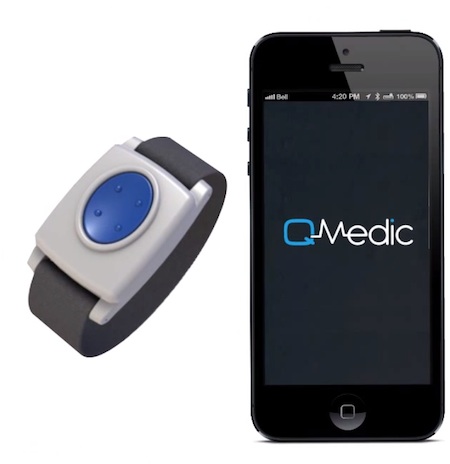 Personal emergency response system (PERS) maker QMedic has won $2.2 million from the National Cancer Institute "to create next-generation passive sensing and self-report tools to enhance clinical interventions for at-risk patients."
Personal emergency response system (PERS) maker QMedic has won $2.2 million from the National Cancer Institute "to create next-generation passive sensing and self-report tools to enhance clinical interventions for at-risk patients."
The funding will allow the team to launch a three year clinical pilot with Northwestern University’s Robert H. Lurie Comprehensive Cancer Center (RHLCCC) in Chicago, and the Rehabilitation Institute of Chicago (RIC), which will focus on delivering mobile health interventions to cancer rehabilitation patients in remote location.
Medical Director of RHLCCC-RIC Dr. Samman Shahpar believes QMedic's technology could "significantly improve the quality of care by enabling [the organization] to identify early on which patients are good candidates for cancer rehabilitation services," according to a written statement.
"We're baselining every individual's activity and behavior and then identifying deviations from normal," QMedic CEO Sombit Mishra said at a presentation at Health 2.0 in Santa Clara. "We're able to look at changes in balance over time and also if they're falling. Since we're working with a clinical partner we can also add-in self-reported data -- stress level, medical conditions -- to really improve the level of prediction. The whole goal is: How can we help our loved ones age in place and not in the hospital?"
QMedic initially offered an activity tracker but the product pivoted to be an mPERS device. The product is a bracelet with an emergency response activating button on it. If the button isn't pressed, the bracelet will still detect how the user is sleeping, if the user is wearing the device, where the user is and the what the user's activity levels have been.
“To this point, passive sensing has been limited to ‘quantified self’ applications, which appeal to the fitness enthusiast but offer little to no insight to clinicians interested in shifting the paradigm of care delivery from treatment to prevention,” Mishra said in a written statement. “Our partnership with Northwestern and the National Cancer Institute is designed to validate and scale an integrated mHealth approach for measuring and improving patient outcomes in the home.”
Mishra shared some other news at Health 2.0: QMedic is recruiting a designer from Cartier to create a more fashion-forward version of their device, he said.
QMedic presented at MobiHealthNews' Boston-based Mobile Monday event in April. At the time, Mishra called QMedic the "only wearable sensing platform that continually and passively monitors physical activity, sleep, and falls in the home without requiring battery recharge.”
Additional reporting from Jonah Comstock on the scene at Health 2.0 in Santa Clara, California.



















